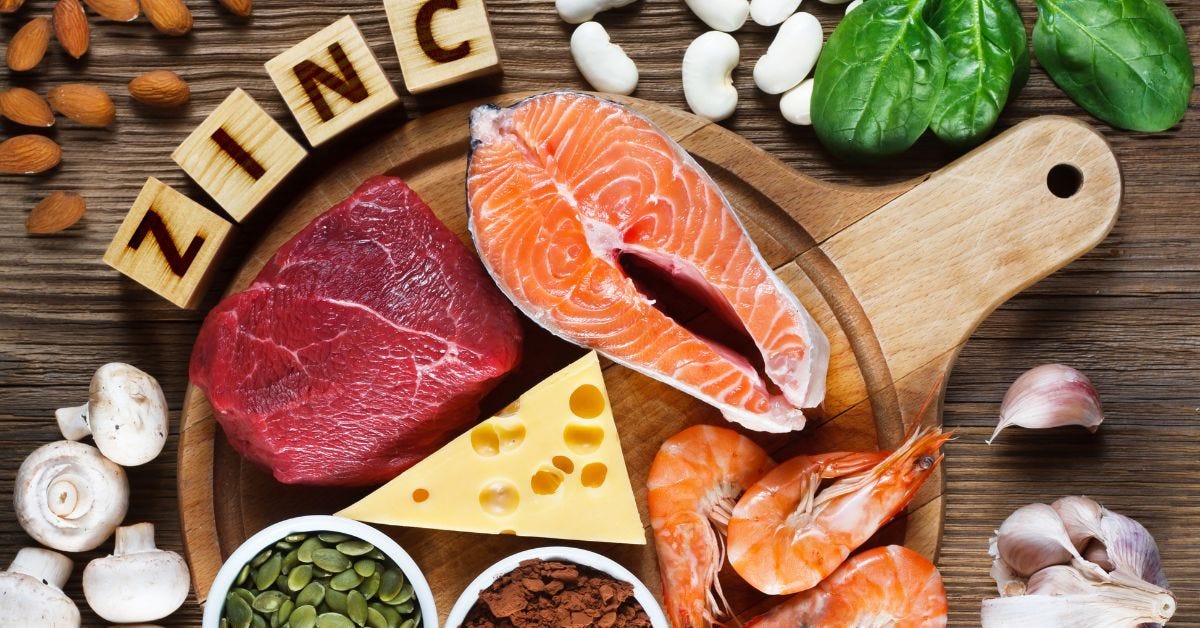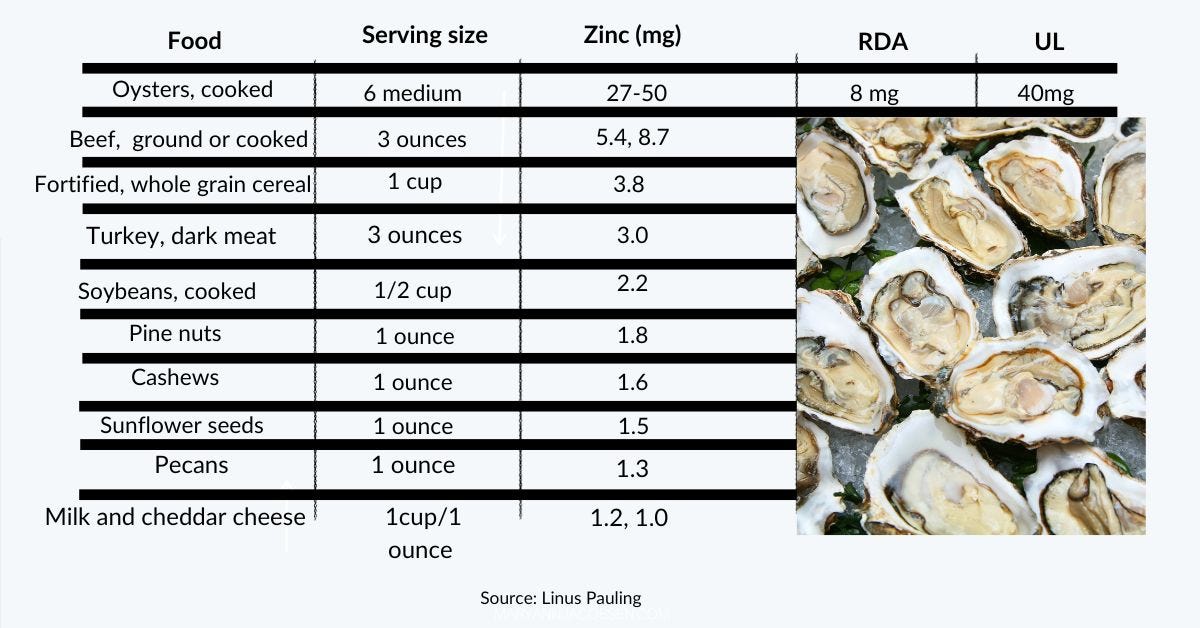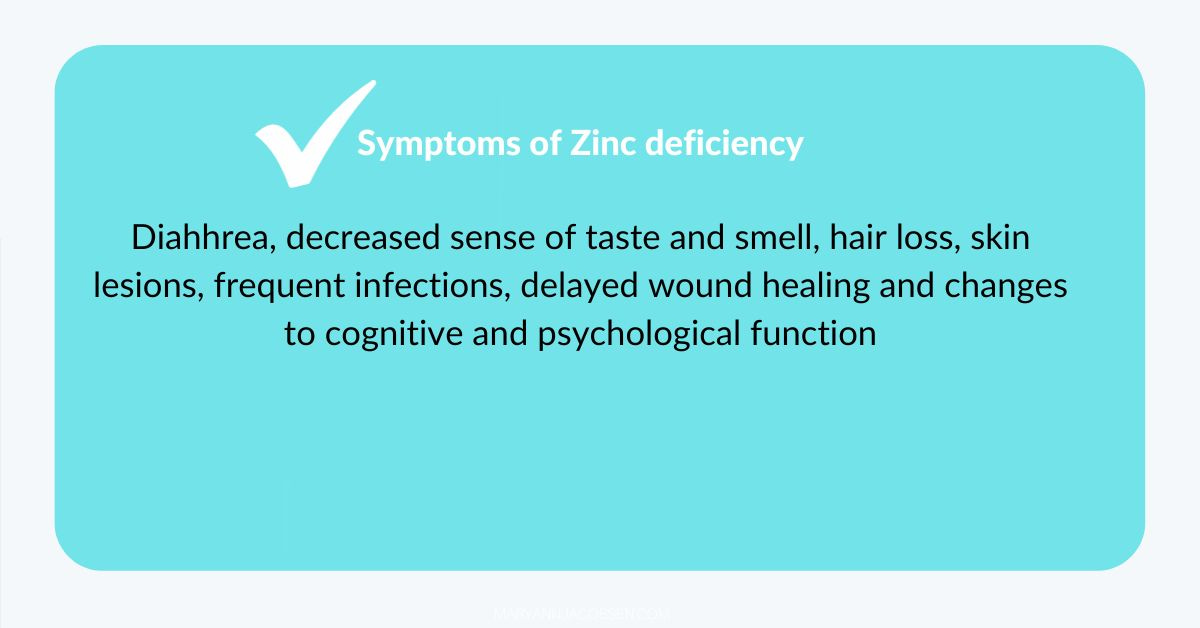When I did my webinar on micronutrient deficiencies, someone asked about zinc. I realized I haven’t written about zinc.
How could this be?
Zinc is an important micronutrient during "aging pause" and many women fall short without even knowing about it.
It's one of those tricky micronutrients that requires the right balance. Too little and too much is not good.
Given that it's cold, flu, and covid season, a time people may turn to zinc, let’s get into the details.
But first I want to mention an important aspect of defining micronutrient needs in midlife.
Micronutrients: treatment versus optimal levels
I often hear or read that supplementing with X nutrient helps with Y condition. To me, this differs from optimizing a person’s nutrient status.
The latter is what I focus on. When we use a micronutrient supplement to treat something, it's working more like a medication. And I feel that needs intense research and monitoring from a healthcare provider.
Some examples include high doses of niacin to treat high cholesterol, magnesium for headaches, omega-3 fatty acids to lower triglycerides, and ARED2 for macular degeneration (contains 80 mg zinc!). In these cases, there is a therapeutic dose and the nutrient status of the individual is not a consideration.
I think this is an enormous problem with researching micronutrients, and something I won’t go into here. Just know that I’m focusing on reaching optimal levels and not treatment.
And as always, this information is intended for education, not to replace medical advcie. With this in mind, let’s get into how to reach optimal levels of zinc.
Zinc homeostasis in the body
Zinc, an essential trace element, acts as a cofactor for over 300 enzymes and is found in 3000 human proteins!
It’s found in all tissues with the highest levels in muscle and bone, followed by the liver. The human body contains 2.6g of zinc.
The expression of zinc “importers” and “exporters" regulates zinc through absorption and excretion. Inflammatory GI diseases, low stomach acid, medications like PPIs and Ace inhibitors, and thyroid dysfunction can inhibit its absorption.
Although blood levels of zinc can show deficiency, they can be normal when zinc status is inadequate. We don’t have a reliable biomarker, which maddens me.
The RDA for midlife women is 8mg, and vegetarians need 50% more to meet their needs. That's because even though zinc is present in both animal and plant foods, our bodies absorb it better from animal foods.
Phytates in plant foods can decrease zinc's absorption, while total protein intake maximizes absorption (more about that later).
Zinc functions
If the body doesn’t have enough zinc, it compromises 300 different enzymes and 3000 proteins. This is why zinc is involved in numerous bodily functions.
It helps decrease oxidative stress, aid cognitive function, ensure cells – including immune cells — function properly, and it protects the mucosal barrier in the intestine. Zinc is part of antioxidant enzyme superoxide dismutase (with copper) and plays a role in collagen synthesis.
Zinc has also been found to increase folate aiding in the lowering of homocysteine. It is linked to thyroid health by helping T3 become biologically active, and deficiency may induce hypothyroid. It also may play a role in mood swings, such as depression, and aids proper vision.
And let's not forget that zinc is necessary for the growth of hair, skin, and nails, as well as for the functioning of bones. Overall, deficiency can negatively affect how the body functions. For more on this see this review which includes the following diagram of zinc in the body.

It’s vitally important we ensure good zinc status with aging pause. Let’s dig a little deeper into these functions that might be affecting a midlife women's health.
Zinc & the Immune system
Zinc has been called "the gatekeeper of the immune system" as the functioning of immune cells are highly zinc dependent. When there is not enough zinc, it compromises cell and antibody responses that can increase the risk of infection.
When zinc deficiency ensues over time, it causes a reprogramming of the immune system. This causes atrophy of the thymus, a part of the body that makes white blood cells, and changes to gene expression for cytokines, DNA, and zinc exporters to adapt to low zinc status.
But what may be most important is improving zinc status before being exposed to infectious agents. That’s because zinc has antimicrobial properties which work to keep pathogens from entering the body.
A 2021 review puts it this way:
“…according to our current knowledge, preventive zinc supplementation, especially of zinc-deficient individuals, is favorable, as preventive zinc supplementation decreases disease severity, progression, and mortality.... Zinc supplementation during the acute phase of an inflammatory disease may be detrimental as well, although fewer studies have addressed this point.”
But here’s the kicker. According to this same review, “high zinc excess provokes an impairment of the immune system comparable to zinc deficiency.”
So, yeah, we need to be careful.

Zinc & Reproduction
Zinc is also necessary for a functioning reproductive system. That’s because reproductive cells are zinc dependent due to their high level of differentiation and proliferation in both women and men.
Zinc supplementation has been studied in women with PCOS, period pain, and endometriosis, yielding positive results. These populations tend to be low in zinc, so it’s not clear if optimizing levels or zinc works as a treatment.
There's less research on midlife and menopause other than its known role in collagen synthesis and possibly vaginal health. Its status in the body doesn’t seem to be affected by estrogen like other micronutrients. Some studies suggest zinc declines with aging, which makes sense as it requires strong stomach acid for absorption.
One study caught my eye, though. A randomized control trial on 116 postmenopausal women with low sexual function with low serum zinc. Researchers gave one group 22mg zinc and the other a placebo.
Compared to the control group, those supplemented with zinc had improved sexual desire, orgasm, vaginal moisture, and pain during intercourse. They also had high testosterone and a trend toward better sexual function (non-significant).
So, if this can be replicated, those who improve their zinc status may boost vaginal and sex health.
Zinc & the Gut
Adequate zinc helps to maintain the functioning of intestinal mucosal barrier in the GI tract. When there’s not enough zinc, it can become impaired and increase intestinal permeability, or what is referred to as leaky gut.
This can alter the immune response and microbiota, increasing the risk of inflammatory bowel disease, irritable bowel syndrome (IBS) and colorectal cancer.
That being said, it is not known if improving zinc status prevents or alleviates these conditions because the research is lacking.
Many women in midlife will experience changes in their gastrointestinal health, so it’s worth considering zinc. In fact, people with IBS have been found to have lower zinc compared to age-matched controls without IBS.
Zinc & the Thyroid
A 28-year-old female presented with hair loss, loss of taste, skin lesions, and depression. Tests revealed hypothyroidism. After being given thyroid medication, she only improved slightly. Further testing revealed zinc deficiency.
Once they supplemented her with zinc, her symptoms and thyroid function resolved.
In extreme circumstances like this, zinc deficiency can cause hypothyroidism. That’s because zinc is required for the T3 receptor to become biologically active.
One must wonder what happens when zinc is a short fall, but doesn’t cause outright deficiency. Could this also affect thyroid health?
Zinc and copper levels were measured in 40 patients, both with and without hypothyroidism. Those with hypothyroid had lower concentrations of zinc. Additionally, T3 showed a positive relationship with zinc.
Of course, maybe people with hypothyroid also have decreased absorption of zinc, so it’s difficult to pinpoint what came first.
In any case, zinc is essential for thyroid function. Midlife women are at heightened risk of thyroid dysfunction benefit from staying aware of their zinc status.
Zinc & Metabolic Health
The last aspect of zinc on the body is metabolic health as it has been linked to metabolic diseases such as diabetes.
In fact, zinc supplementation has been found to aid glycemic control, showing it plays a role in glucose metabolism.
Zinc status is also related to bone health. Bones contain more than 30% of body zinc. During zinc deficiency, disrupted bone marrow metabolism and low bone density has been found. Zinc supplementation has also been found to help improve bone density in humans and animals.
“Low serum zinc levels revealed predictive value regarding altered bone mineral density in humans, and dietary-induced zinc deficiency caused a reduction in bone density in rats.”
-Wessels et al, Annual Review of Nutrition, 2021
Zinc Status & Diet
How much zinc do midlife women get? It’s tough to pinpoint. One study in Ireland found that 87% of women had inadequate zinc levels.
The best place to start is with your diet. If you consume both animal and plant sources, you likely will have higher intake and absorption than if you get them mostly from plants. Also, absorption increases with higher protein intake.
Phytates in animal foods inhibit the absorption of zinc, but animal proteins counteract it.
Next up, you’ll want to consider potential absorption issues such as medications like PPIs and ace inhibitors, GI conditions and thyroid dysfunction. Perhaps in these cases it's beneficial to ask to get your zinc levels checked.
Zinc Supplements
The tolerable upper intake for zinc is 40mg. There are some watchouts when adding zinc supplements.
Iron and zinc deficiency commonly coexist, and improvement in zinc deficiency can improve iron status. But continually consuming supplemental zinc may also decease iron status as they compete for absorption pathways.
In a 2002 study with young women with ferritin <20ng/l were given either iron (100mg/day) or zinc (22g/day). The iron supplemented group had an increase in ferritin with no change in zinc levels. But the group supplemented with zinc showed decreases in iron over 70 days.
Now this is one study, and the ferritins were low, so it's hard to say if this happens in iron sufficient women.
When iron and zinc are both needed, it’s best to take them separately. For example, taking iron in the morning and a multivitamin with zinc in the afternoon. Iron is always better taken alone because many factors — including zinc—can decrease its absorption.
High levels of zinc can also induce a copper deficiency, but higher levels, such as 50mg or more, is needed.
Studies by Beiseigel et al. show a saturation response with zinc supplementation. In postmenopausal women given diets with 14 mg, 32 mg or 47 mg zinc, the higher amounts showed increased absorption at first, but by week 8 they were almost even (5.4, 5.8 and 6.4).
By week 16, absorption in the three groups was 5mg, showing the body eventually adapts to higher levels of zinc.
This doesn’t mean higher levels can’t treat a zinc deficiency, but that is usually for a short period of time. Long-term supplemental zinc of supplemental levels of 12-15mg seems the safest choice, as determined in this 2021 review in Annual Review of Nutrition:
“long-term daily zinc intake via supplements meeting the recommended daily allowance (8–15 mg/day, depending on the country and organization) and not exceeding 20 mg/day can be regarded as safe. In clinical supplementation studies, the chosen doses are often higher but are usually used for a limited time, and in most cases individuals with mild to severe zinc deficiency are treated.”
I take a multivitamin that contains 15mg of zinc every other day. I also eat both plants and animal foods and no other risk factors.
A multi is a good place to get additional zinc plus other nutrients like iodine, B vitamins etc. Centrum silver contains 11mg.
Summary
Thank you for sticking with this post!
Needed for countless processes in the body, zinc plays a role in many aspects of our health. Watching your diet, ability to absorb, and smart supplementation can help ensure you're getting what you need.
We need just the right amount and too little or too much may not benefit health.
Unfortunately, without an established biomarker, we must do our best with what we know. I’ll leave you with a quote from researchers that says what we really need in the zinc conversation:
“An urgently needed prerequisite to advance our knowledge regarding the causality of zinc deficiency and other diseases is a valid biomarker to assess a person's zinc status.”







